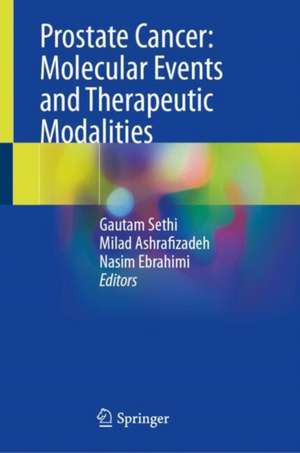Prostate Cancer: Molecular Events and Therapeutic Modalities
Editat de Gautam Sethi, Milad Ashrafizadeh, Nasim Ebrahimien Limba Engleză Hardback – oct 2024
This book is completely novel and unique and covers all aspects of prostate cancer progression and challenges in therapy while presenting solutions. Written by prestigious researchers around the world, this book will be interesting to researchers and practitioners, especially those working in urological cancers.
Preț: 913.76 lei
Preț vechi: 961.85 lei
-5% Nou
Puncte Express: 1371
Preț estimativ în valută:
174.85€ • 190.52$ • 147.33£
174.85€ • 190.52$ • 147.33£
Carte disponibilă
Livrare economică 02-16 aprilie
Preluare comenzi: 021 569.72.76
Specificații
ISBN-13: 9789819746118
ISBN-10: 9819746116
Ilustrații: XXX, 250 p.
Dimensiuni: 155 x 235 mm
Greutate: 0.64 kg
Ediția:2024
Editura: Springer Nature Singapore
Colecția Springer
Locul publicării:Singapore, Singapore
ISBN-10: 9819746116
Ilustrații: XXX, 250 p.
Dimensiuni: 155 x 235 mm
Greutate: 0.64 kg
Ediția:2024
Editura: Springer Nature Singapore
Colecția Springer
Locul publicării:Singapore, Singapore
Cuprins
Chapter 1. Anatomy and function of prostate.- Chapter 2. Epidemiology, risk factors and histopathological profile of prostate cancer.- Chapter 3. Prostate cancer and Inflammation.- Chapter 4. Prostate cancer, apoptosis, autophagy and ferroptosis: Cell death mechanisms and their crosstalk.- Chapter 5. Prostate cancer and metastasis: An emphasis on EMT mechanism.- Chapter 6. Prostate cancer and Wnt/STAT3 signaling.- Chapter 7. Prostate cancer and EZH2 signaling.- Chapter 8. Prostate cancer and PTEN/PI3K/Akt/mTOR signaling.- Chapter 9. Prostate cancer and non-coding RNAs: A focus on miRNAs, lncRNAs and circRNAs.- Chapter 10. Prostate cancer and tumor microenvironment.- Chapter 11. Chemoresistance, radioresistance and androgen-deprivation therapy resistance in prostate cancer.- Chapter 12. Plant derived-natural products in treatment of prostate cancer.- Chapter 13. Gene therapy as a new emerging strategy for prostate cancer.- Chapter 14. Nanoparticle-based therapeutic strategies in prostate cancer suppression.
Notă biografică
Gautam Sethi
Yong Loo Lin School of Medicine, Department of Pharmacology, National University of Singapore, Singapore
Milad Ashrafizadeh
Faculty of Engineering and Natural Sciences, Sabanci University, Orta Mahalle, Üniversite Caddesi No. 27, Orhanl#, Tuzla, 34956, Istanbul, Turkey, istanbul, Turkey
Yuzhuo Wang
Department of Urological Sciences and Vancouver Prostate Centre, University of British Columbia, Vancouver, BC V6H3Z6, Canada, British Columbia, Canada
Milad Ashrafizadeh
Faculty of Engineering and Natural Sciences, Sabanci University, Orta Mahalle, Üniversite Caddesi No. 27, Orhanl#, Tuzla, 34956, Istanbul, Turkey, istanbul, Turkey
Yuzhuo Wang
Department of Urological Sciences and Vancouver Prostate Centre, University of British Columbia, Vancouver, BC V6H3Z6, Canada, British Columbia, Canada
Textul de pe ultima copertă
The book covers the various cell signaling pathways responsible for prostate cancer progression, conventional therapies used for prostate cancer treatment, new emerging therapeutics, and challenges in the treatment of cancer patients. It describes the different molecular pathways responsible for prostate cancer progression to improve readers' knowledge about the role of signaling networks, and cellular and molecular aspects of prostate cancer progression. These topics include mechanisms responsible for prostate cancer malignancy with a focus on molecular pathways. It also discusses the current challenges in prostate cancer treatment such as drug resistance and immune evasion and introduces novel therapeutics such as gene therapy and nanotherapeutics for prostate cancer.
This book is completely novel and unique and covers all aspects of prostate cancer progression and challenges in therapy while presenting solutions. Written by prestigious researchers around the world, this book will be interesting to researchers and practitioners, especially those working in urological cancers.
This book is completely novel and unique and covers all aspects of prostate cancer progression and challenges in therapy while presenting solutions. Written by prestigious researchers around the world, this book will be interesting to researchers and practitioners, especially those working in urological cancers.
Caracteristici
Provides detailed outline that covers all aspects of prostate cancer progression Describes current challenges in prostate cancer therapy and presents solutions for them Emphasis on both molecular and cellular mechanisms responsible for prostate cancer malignancy
